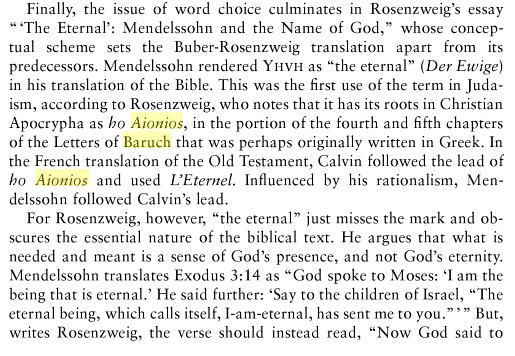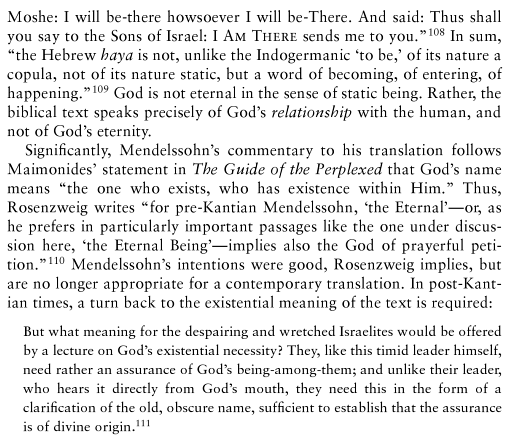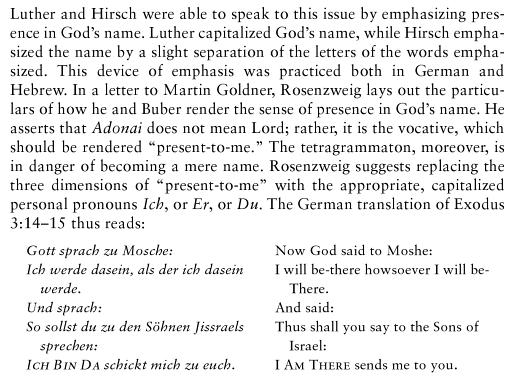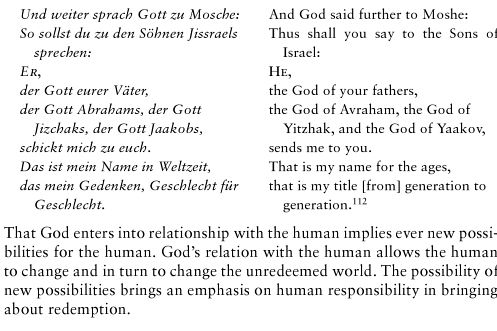The end of time and space …
When I was little, I was asked a riddle, “What is the beginning of eternity, and the end of time and space?” See the end of the post for the answer. I also noticed that the LORD was L’Éternel in French, my grandfather’s language. In German, the LORD is Der Ewige.
I finally decided to track this down. Here is Exodus 3:13-15 in several different translations, Hebrew, Olivétan 1535, Luther, 1545, and Mendelssohn, 1780 and finally Buber-Rosenzweig.
וַיֹּאמֶר מֹשֶׁה אֶל-הָאֱלֹהִים
הִנֵּה אָנֹכִי בָא אֶל-בְּנֵי יִשְׂרָאֵל
וְאָמַרְתִּי לָהֶם, אֱלֹהֵי אֲבוֹתֵיכֶם שְׁלָחַנִי אֲלֵיכֶם;
וְאָמְרוּ-לִי מַה-שְּׁמוֹ,
מָה אֹמַר אֲלֵהֶם.
וַיֹּאמֶר אֱלֹהִים אֶל-מֹשֶׁה,
אֶהְיֶה אֲשֶׁר אֶהְיֶה;
וַיֹּאמֶר, כֹּה תֹאמַר לִבְנֵי יִשְׂרָאֵל,
אֶהְיֶה, שְׁלָחַנִי אֲלֵיכֶם.
וַיֹּאמֶר עוֹד אֱלֹהִים אֶל-מֹשֶׁה,
כֹּה-תֹאמַר אֶל-בְּנֵי יִשְׂרָאֵל,
יְהוָה אֱלֹהֵי אֲבֹתֵיכֶם
אֱלֹהֵי אַבְרָהָם אֱלֹהֵי יִצְחָק וֵאלֹהֵי יַעֲקֹב,
שְׁלָחַנִי אֲלֵיכֶם;
זֶה-שְּׁמִי לְעֹלָם,
וְזֶה זִכְרִי לְדֹר דֹּר.
Et Moseh dit à Dieu:
Voici, j’irai aux enfants d’Israël et leur dirai:
Le Dieu de vos pères m’a envoyé vers vous;
et s’ils me répondent:
Qui est son nom? Que leur dirai–je?
Et Dieu dit à Moseh:
Je suis qui suis Puis il dit:
Tu diras ainsi aux enfants d’Israël:
Je suis m’a envoyé vers vous.
Et Dieu dit encore à Moseh:
Tu diras ainsi aux enfants d’Israël:
L’Eternel, le Dieu de vos pères,
le Dieu d’Abraham, le Dieu d’Izahak, le Dieu de Jakob,
m’a envoyé vers vous.
C’est mon nom éternellement
et le mémorial de moi au siècle des siècles.
Mose sprach zu Gott:
Siehe, wenn ich zu den Kindern Israel komme
und spreche zu ihnen:
Der Gott eurer Väter hat mich zu euch gesandt,
und sie mir sagen werden:
Wie heißt sein Name?
was soll ich ihnen sagen?
Gott sprach zu Mose:
ICH WERDE SEIN,
DER ICH SEIN WERDE.
Und sprach: Also sollst du den Kindern Israel sagen:
ICH WERDE SEIN hat mich zu euch gesandt.
Und Gott sprach weiter zu Mose:
Also sollst du den Kindern Israel sagen:
Der HERR, eurer Väter Gott, der Gott Abrahams, der Gott Isaaks, der Gott Jakobs,
hat mich zu euch gesandt.
Das ist mein Name ewiglich,
dabei soll man mein Gedenken für und für.
Mosche sprach zu Gott:
wenn ich nun zu den Kindern Israels comme,
und sage ihnen
Der Gott eurer Väter sendet mich
und sie sprechen
Wie ist sein Name
was soll ich ihnen sagen?
Gott sprach zu Mosche :
Ich bin das Wesen, welches ewig ist !
Er sprach nämlich, so sollst du
zu den Kindern Israels sprechen, das Ewige
Wesen, welches sich nennt, ich bin ewig,
hat mich zu euch gesendet.
Gott sprach ferner zu Mosche
So sollst du zu den Kindern Israels sprechen
Das ewige Wesen welches sich nennt, ich bin ewig
Der Gott eurer Voraltern
der Gott Abrahams, der Gott Isaschs, der Gott Jakobs
sendet mich zu euch
Dieses ist immer meine Name,
und dieses soll mein Denkwort
sein in zukünftigen Zeiten
It seems that Olivétan was the first to use “L’Éternel” in a Bible translation and Mendelssohn followed that. However, he also wrote about the expression ho Aionios in the the Letter of Baruch. Here is a discussion of Rozenzweig’s response to the use of Der Ewige for God.
I am not sure if anyone else is interested in these things, but I am. It’s nice to have so many early Bibles online. I know the commentary mentions Calvin and not Olivétan, but Calvin did not produce a Bible translation. He did later write about l’Éternel in a commentary. I don’t know which influenced Mendelssohn. PS. And the answer to the riddle is “E.”
Trackbacks
- Pornos für Honecker – als Dank Doktortitel mit Bestnote | GFM RIMPLER III, Generalfeldmarschall Preußen
- Ich werde von DEN JUDEN verfolgt wie Jesus NAZIretine | GFM RIMPLER III, Generalfeldmarschall Preußen
- Biblioblog Carnival — November 2013 | Soli Deo Gloria
- Biblioblog Carnival — November 2013 | Kosmosdale Baptist Church






Delightful – Every time I turn around there is that time-space construct to deal with. I like to see it disappear into the presence.
Interesting!
I was surprised by this, though:
I grew up in a largely Quebecois Francophone Catholic population, and I don’t recall “L’Eternel” at Mass or in the worship aids; I learned “Le Seigneur” for “The Lord”, which I particularly remember because I could see the etymological connection to “monsieur.”
So I’m curious whether this is a regional/dialect difference, or whether it was contextual: in your grandfather’s French, was the Lord *always* L’Eternel, or only in some contexts?
Hi Victoria,
It is much simpler than that. My grandfather was Protestant, from near Geneva, and all Protestant Bibles in French have always used “l’Éternel” since Olivetan introduced the expression in 1535. Le Seigneur is “our Lord” that is Jesus Christ, but God is “L’Éternel.” It is the translation for Yahweh. For Luther God was der HERR, but Medelssohn used der Ewige, or das Ewig Wesen. Then Buber and Rosenzweig used “Ich Bin Da.” I am there.
Bob,
You are playing with Rosenzweig’s problem, Is God the one who is eternal or the one who is present? He chose ICH BIN DA, but he did think the Eternal God was an improvement over the LORD God.